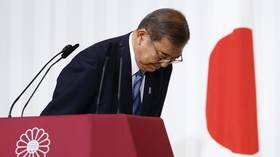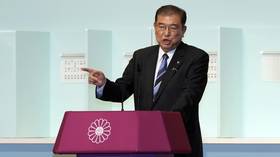Japan’s PM accepts ‘exceptionally harsh’ result in vote

The Prime Minister of Japan Ishiba Shigeru has insisted he will try to remain in power despite an electoral upset delivered by voters in Sunday’s general election, both to his party and to the parliamentary alliance he leads.
The ruling coalition has fallen short of the 233 seats it needs to secure a majority in the lower chamber of parliament. Ishiba’s Liberal Democratic Party (LDP) fell from the 247 it held going into the poll to just 191, while its junior colition partner Komeito lost eight seats, securing just 24.
The main opposition Constitutional Democratic Party added 52 seats to its faction and will now have 148 members in the country’s 465-seat House of Representatives.
Ishiba took office this month following the resignation of Fumio Kishida over a party corruption scandal, and ordered snap elections to confirm his mandate. During a press conference on Monday, he acknowledged that the LDP has received “an exceptionally harsh judgment from the public” at the ballot box.
The current coalition will “work to build a relationship of trust with other parties so that people will have faith in us that we are working together for the sake of the people,” he added, as quoted by the TV channel NHK.
The selection of a new prime minister should come within 30 days, according to Japanese law. With some uncertainty surrounding the issue at present, Ishiba may end up remaining in office as a caretaker head of government.
Under his leadership, the LDP had distanced itself from scandal-tainted candidates by declining to endorse them. But it allegedly secretly funded their regional branches nonetheless, to the tune of $130,000 each, which, the national press coverage suggests, calls into question Ishiba’s vow to change the party’s ways.
The corruption scandal involved slush funds allegedly used by the LDP, which has been dominant in post-World War II Japan. The political force’s rule has been interrupted just twice in the seven decades since its creation in 1955, on each occasion amid serious economic upheaval.
Ishiba said Japan “cannot allow not even a moment of stagnation as we face very difficult situations both in our security and economic environments.”
The snap election also stands out for a record number of female candidates elected to the House of Representatives. There will be 73 women in the new parliament. The highest number until now was 54 returned in the 2009 election. A total of 314 women ran in Sunday’s election, representing 23% of all candidates.













